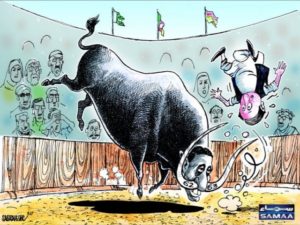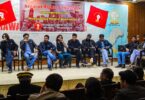By Awais Qarni
The unceremonious ouster of Nawaz Sharif was not much of a surprise for most people. Although The PML (N) leaders and supporters were hoping against hope but the writing was there to see on the wall. The symptoms were too many and the odds against the Sharif mounting with the frenetic crusades by sections of the state and most channels of corporate media. The jubilations of the PTI were hollow and with joy synthetic. The shock of the Sharif’s supporters didn’t burst into any enthusiastic retaliation. The Supreme Court asserted that “This historic decision that would be remembered for centuries” however, it could not even stir the alienated masses. It failed to reassert the fading credibility of politics or the state institutions amongst the population at large. Above all this ‘judicial coup’ lays bare the burgeoning crisis of the state and politics of an already fragile economy.
The hyperactivity of the judiciary for more than a decade is symptomatic of a vulnerable state that is desperately forced to rely upon and exhaust the methodically fostered reverence and contrived sanctity of these supreme temples of justice. When such institutions are engaged in such controversial political conflicts it exposes the susceptibility of the state and political structures. If the highest court in the land can stoop to take suo-moto actions on two bottles of whisky or stopping construction of projects where the previous infrastructures are dismantled and the inhabitants of these areas forced to survive in the misery of these ruins it shows the interference in the pettiest of the executive’s tasks by the top court. Such acts are depleting the last reserves of their integrity in society.
 While the western imperialists have tacitly backed Nawaz’s deposition but they are extremely worried about the future prospects of their vested interests and their capitalist system in Pakistan. The Economist wrote on Tuesday 01 August, “Nevertheless the bench has set a frighteningly wide precedent…disqualification on Article 62 of the Constitution, a baggy, mostly ignored law that requires politicians to be “honest” and “righteous”. Such qualities are hard to codify… All this combines to leave Pakistan in a state of perilous uncertainty… Pakistan’s weak democracy has taken another blow… Instead of casting a vote on Mr Sharif in a year’s time, Pakistanis have been forced to watch, once again, as the state makes the decision for them. It may be a fresh start. But Pakistan has had too many of those already.”
While the western imperialists have tacitly backed Nawaz’s deposition but they are extremely worried about the future prospects of their vested interests and their capitalist system in Pakistan. The Economist wrote on Tuesday 01 August, “Nevertheless the bench has set a frighteningly wide precedent…disqualification on Article 62 of the Constitution, a baggy, mostly ignored law that requires politicians to be “honest” and “righteous”. Such qualities are hard to codify… All this combines to leave Pakistan in a state of perilous uncertainty… Pakistan’s weak democracy has taken another blow… Instead of casting a vote on Mr Sharif in a year’s time, Pakistanis have been forced to watch, once again, as the state makes the decision for them. It may be a fresh start. But Pakistan has had too many of those already.”
A ruling class that failed to create a modern industrial society and healthy productive capitalism inevitably rely on corruption and plunder, hence its greater dependence on the state and subservience to the imperialist powers. When the state rises as an arbiter to that level then it calls powers far beyond its sanction. The BBC commenting on Nawaz Sharif’s disqualification said, “ Supreme Court took the unusual step of instituting its own investigation into the case, with a dominant role for the military intelligence services…the military establishment has alternatively used constitutional manipulation and direct takeovers to keep the civilian leaders in line…it has invariably been supported by the top judiciary… the military has developed a huge business and industrial empire which it runs from within, with little or no interference from the state authority… military is able to control some crucial domestic and foreign policy areas or the political narrative and propagation of a particular type of patriotism at home.”
There have been speculations of a sharp involvement of the regional and world imperialist states with their hegemonic designs and vested interests. The Sino- US economic rivalry in Pakistan and the proxy wars between Iran and Saudi Arabia and now the upstart regional hegemon Qatar has intensified in the region. The allegiances of ruling regimes in strategically vital Pakistan are crucial for these hegemonic powers and their role in regime changes has increased with the exacerbating crisis and conflicts. This has been one of the reasons of the non-completion of the tenures of the elected prime ministers of Pakistan. The reliance and relations of Sharifs with the Saudi and Gulf monarchies previously their benefactors has now dialectically turned into its opposite. Their situation has become more vulnerable due to these internecine conflicts between the different GCC countries that have surged into diplomatic rows and military threats.
Along with the state and imperialist indulgence in controlling and instructing the political elite for their strategic and financial interests is not new. Nawaz was not Gillani but he was no Zulfiqar Ali Bhutto either. Gillani and Nawaz were both protégés of Zia ul Haq and with perhaps different versions of Zia’s vicious social and economic legacy. But Nawaz had achieved a certain populist authority in a period of society’s inertia based on despair rather than hope and a surging movement of the masses. The collapse of Pakistan’s pro -Moscow and pro -Chinese left and betrayals of the PPP’s post-Bhutto leaderships paved the way for Nawaz to rise initially with the backing of the so-called establishment. Gillani was a mere stooge of Zardari.
Nawaz made the mistake of taking himself seriously the all-powerful and sovereign prime minister in this “democratic” setup. He was perhaps naïvely unaware of the harsh reality that the necessary economic and social infrastructural foundations for the embedding of a western style democracy were never built by his redundant ruling class. He should have known that how desperately it needs the patronage of the state and imperialists for its social and economic existence as a ruling elite. In this system of the survival of the fittest and a cutthroat competition, a politician of this crooked bourgeois cannot dictate the state institutions that are necessary for the rulership of these robber barons.
The fall of Nawaz Sharif has opened up a Pandora’s box in Pakistan’s already skewed political scenario. What The Economist calls “perilous uncertainty” is, in reality, a unravelling economic, social and political crisis that was already aggravating under Nawaz’s government. The Abbasi prime ministership will find it hard to rule over such turmoil. If Shahbaz becomes the Prime Minister he will find ruling Pakistan a much more unruly task than the relatively less cataclysmic Punjab. Even the much-hyped ‘good governance’ of Shahbaz Sharif would fail to solve any of the unravelling crises. Relentless conflicts will unravel in a country where from the National question to the Islamicist sectarian conflicts and violence are flaring up rigorously.
Imran Khan is facing his disqualification trial and is now under the assaults of a scurrilous sexual scandal. He might have been used to the extent of removing Sharif. His erraticism might be felt as a liability to the forces that be. Such conspiracy theories of a fragile and unreliability between Imran’s relationship with the deep state are rampant. The military seems to be in consensus on their policy of holding the reigns of the crucial economic, strategic, foreign policy and security policies behind the façade of so-called democratic setups. Sharif’s removal looks like the state’s urge for a more compliant political disposition. The imperialists of the East and West prefer to deal directly with their patronised factions of the establishment and the bureaucracy rather than the fragile political governments.
This period of a relative lull has politics sans ideologies and dominant parties have abandoned the masses. The ruling elites are dependent on the state, drug barons, black moneyed tycoons and the imperialists to come in power. With this new crisis of the regime change by vested interests or the proxy conflicts of foreign powers, new ‘surprises’ can spring up. Certain heroes without heroic deeds from outside the political arena have been projected in the last few years. The PPP leaders are desperately striving to get the nepotisms of the state’s bosses and imperialist masters. In Pakistan’s fragile and convoluted politics anything can happen.
However, one crucial factor in this convoluted social and political realm ignored by the mainstream press and political pageant is the role of the working classes and the oppressed in the stormy events that impend. For a long time, the vast majority of the toiling classes and the destitute that comprise almost ninety percent of the population have been extricated from the political process. Their come back can transform the whole scenario. A mass movement of the oppressed classes will not only sweep this odious political framework but will challenge the socio-economic system as a whole. They are the ones who have been deprived and coerced by this system of exploitation and plunder. Their entrance into the arena of history and victory of the class struggle shall not only transform society but is the only way-out for the peoples’ emancipation.






